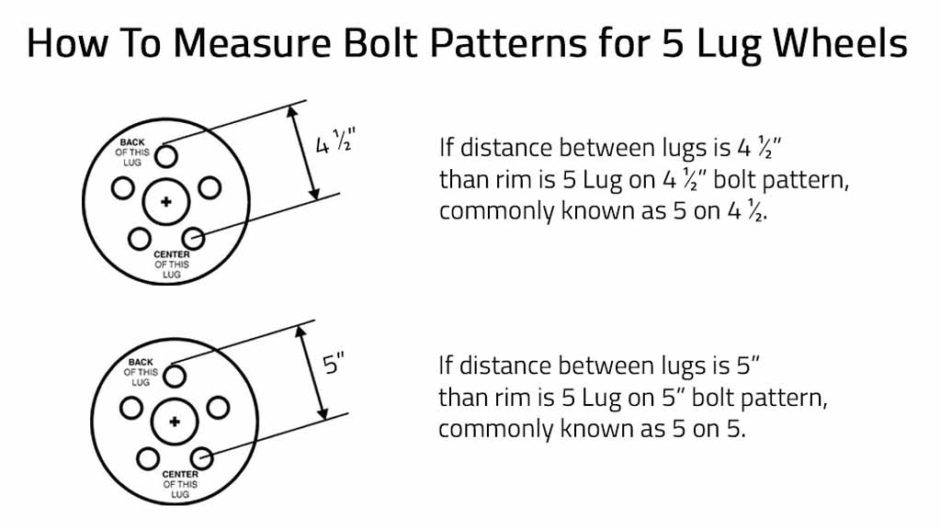Unlocking the Mystery of Your Wheel's Bolt Pattern
Ever stared at a stunning set of wheels, heart aflutter with the desire to adorn your ride with them, only to be stopped dead in your tracks by the ominous question: "Will they even fit?" The answer, my friend, lies locked within the secret code of your car's rim bolt pattern. Decoding this pattern isn't just about aesthetics; it's about safety, performance, and avoiding a potentially expensive mismatch.
Imagine this: you've finally found the perfect rims, sleek and stylish, ready to transform your vehicle into a head-turner. You eagerly order them, picturing yourself cruising down the street, catching envious glances. But when they arrive, disaster strikes. The bolt holes don't align. Frustration mounts. This scenario, sadly, is all too common for those who venture into the world of wheel upgrades without first understanding the critical importance of the rim bolt pattern. So, how do you avoid this automotive heartbreak? Let's dive in.
Figuring out your rim bolt pattern is like finding the right key for a lock. The bolt pattern, also known as the lug pattern or PCD (Pitch Circle Diameter), refers to the arrangement of the bolts or lugs on your wheel hub. It's expressed as two numbers: the number of lugs and the diameter of the circle on which they're located. For example, a 5x114.3 pattern means there are five lugs arranged on a circle with a diameter of 114.3 millimeters.
The history of the bolt pattern is intertwined with the evolution of the automobile itself. As cars developed, so did the need for standardized wheel attachments. Different manufacturers adopted various patterns, leading to the diverse landscape we see today. Identifying the correct bolt pattern has become crucial for ensuring compatibility and maintaining safe driving conditions. An incorrect bolt pattern can lead to loose wheels, vibrations, and potentially dangerous driving situations.
The importance of correctly identifying your rim bolt pattern cannot be overstated. It's the foundation of a safe and proper wheel fitment. Ignoring this crucial detail can compromise your vehicle's stability, handling, and braking performance. Furthermore, using an incorrect bolt pattern can damage your wheel hubs, studs, and even the wheels themselves, leading to costly repairs.
One of the simplest methods to determine your bolt pattern is to physically count the number of lug nuts or bolts on your wheel. Then, for wheels with an even number of lugs, measure the distance straight across from the center of one lug hole to the center of the opposite lug hole. For wheels with an odd number of lugs, measure from the back of one lug hole to the center of the opposite lug hole and use a bolt pattern calculator or chart to find your PCD.
Benefits of knowing your bolt pattern:
1. Safety: Correct bolt pattern ensures your wheels are securely attached, preventing accidents caused by loose or detached wheels.
2. Proper Fitment: Eliminates the hassle of returning incompatible wheels and ensures a smooth and secure installation.
3. Wider Selection: Opens up a world of aftermarket wheel options, allowing you to personalize your vehicle's appearance and performance.
Step-by-step guide:
1. Count the lug nuts.
2. Measure the appropriate distance as described above.
3. Compare your measurements to a bolt pattern chart or use a bolt pattern calculator online.
FAQ:
1. What if I can’t find my bolt pattern online? Consult your vehicle's owner's manual or a trusted mechanic.
2. Can I use adapters to change my bolt pattern? While possible, adapters can affect handling and safety and are generally not recommended.
3. Are all 5-lug patterns the same? No, the PCD varies even with the same number of lugs.
4. What tools do I need? A ruler or caliper is sufficient for measuring.
5. Where can I find a bolt pattern chart? Many online resources and automotive forums provide comprehensive charts.
6. Is determining the bolt pattern difficult? With the right steps, it's a straightforward process.
7. Can I damage my car by using the wrong bolt pattern? Yes, it can damage your hubs, studs, and wheels.
8. What if my measurements are slightly off? Consult a professional for accurate confirmation.
Tips and Tricks:
Clean the wheel hub before measuring for accurate results. Double-check your measurements to avoid errors.
Understanding your car's rim bolt pattern is more than just a technical detail; it's a crucial step towards ensuring your safety, enhancing your vehicle's aesthetics, and unlocking a world of customization possibilities. By following the simple steps outlined in this guide, you can confidently navigate the world of wheel upgrades and avoid the frustration of incompatible fitments. Knowing your bolt pattern empowers you to make informed decisions, saving you time, money, and potential headaches down the road. So, take the time to decode your wheel's secret code. It's a small investment that will pay off in both style and peace of mind. Don't let the mystery of the bolt pattern hold you back from achieving your perfect wheel setup. Embrace the knowledge, and roll confidently into the future with the perfect set of wheels for your ride.
Decoding half ppr running back rankings
Berry ave brown hair highlights the ultimate guide
Jamie lynn spears online content discussion










